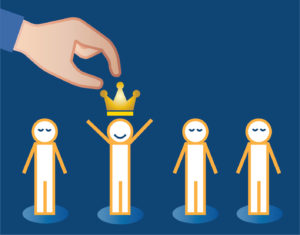
There are many problems associated with workplace diversity. One of the most common ones is favoritism. This happens when the person in authority treats one employee in a more special way than another one regardless of their performance.
Take a scenario of two ladies: Mary and Jackie. Mary could be getting promotions, praises, special attention, and privileges from the boss yet she even performs poorer than Jackie. Such a case can raise suspicion in the workplace. How is Jackie supposed to feel? Favoritism can affect a victim’s performance at work and in general life.
Now, is favoritism in the workplace illegal? Are there any laws that talk about it? Find out.
Favoritism can both be legal and illegal depending on the scenario.
What is legal favoritism?
When you perform well at work, your boss will definitely congratulate you. You can earn yourself a promotion, special treatment, or even a present. This is absolutely okay.
Legal favoritism happens when you’re given special treatment after achieving something great. Most employers practice this kind of favoritism to motivate their employees to work harder. There’s no harm in promoting someone who has proved to be both hardworking and competent. This is self-earned favoritism.
Legal favoritism can also happen when the boss and the employee are related. For instance, if a boss in an employee’s uncle, there’s no way the relationship between the two can be so formal. This is somehow acceptable. However, it shouldn’t go to the extent of giving promotions without merit.

Is there illegal favoritism at the workplace?
Illegal favoritism occurs when a manager deliberately treats an employee better than the rest without any professional reasons. You may be surprised to see your lazy colleague promoted to the supervisor position without merit. This is a perfect example of an illegal favoritism.
Here, an employee gets offers and promotions for no apparent reasons. This can create conflicts among workers, causing low productivity. The sad truth is that illegal favoritism is very common in workplaces.
Sometimes, the boss may favor certain employees on basis of age, race, body size, and other things. If one employee is in her early 20’s while another is in 50’s, the boss may like the younger one just because of her age. Clearly, this is favoritism basing on age.
Effects of illegal favoritism at the workplace
A highly favored employee can receive a lot of resistance from colleagues. This can cause team breakups and work disruption. Consequently, productivity will highly be affected.
In addition, the unrecognized employees may rebel against the management, causing disruption in the work flow. Work ethic also gets affected negatively in such a setup.

How to deal with favoritism
If not controlled well, favoritism can turn a good workplace into a messy and noisy place. The best person to deal with it is the Human Resource manager. Each company should have favoritism in the workplace laws that dictate how managers treat employees.
There should be strict measures and criteria that control promotions and privileges at work. Promotions should only be awarded to employees who have performed extremely well. Any manager found practicing illegal favoritism should also face punishment.
Conclusion
Illegal favoritism can make a workplace toxic. Favored employees may develop pride, causing a huge conflict at work. Other employees may also develop inferiority complex which may affect their performance at work. If a person is only favored on merit, there will be healthy competition and good performance among the employees. This is why favoritism on merit should be encouraged.













